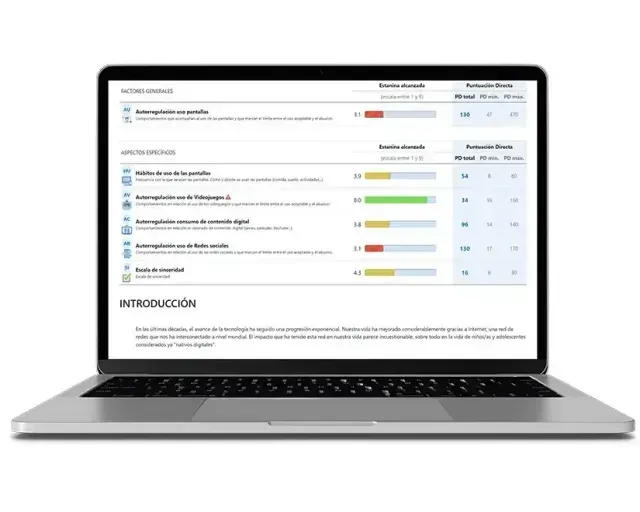Habilmind > Educational Centre Risk Analysis > Screen Abuse Questionnaire
Screen Abuse Questionnaire
Prevention of Technology Addictions
Assessment of the risk level of screen overuse, enabling the detection of self-regulation difficulties and the prevention of technology addictions.
✍🏻 Authors: Rosario Ruiz & Alicia Morón
ℹ️ Application: Collective and individual
🕓 Duration: Approximately 15 minutes
✅
Applicable age: 3 to 18 years


.
What does your school obtain from this tool?
01
Understand
Situations of excessive use of electronic devices among students.
02
Identify
Potential issues related to screen overuse.
03
Intervene
Proactively.
04
Prevent
Negative effects on learning and social relationships.
05
Assess the impact
Through the re-administration of the tool.

Problems you prevent (or mitigate) when using the Screen Abuse Questionnaire
1.Screen addiction: Identifies and addresses addictive behavioural patterns related to excessive use of electronic devices, promoting a healthy balance between digital life and real life.
2.Mental health issues: Helps prevent and mitigate the development of mental health problems such as anxiety, depression, and stress caused by screen overuse and prolonged exposure to digital content.
3.Social disconnection: Reduces social isolation by encouraging mindful and moderate use of electronic devices, promoting face-to-face interaction and meaningful interpersonal relationships.
4.Poor academic performance: Improves academic achievement by minimising distractions and wasted time on electronic devices, allowing students to focus on their studies and schoolwork.
5.Sleep problems: Mitigates sleep disturbances caused by excessive screen use before bedtime, ensuring adequate rest and optimal sleep quality for overall student well-being.
6.Negative impact on family relationships:
Strengthens family bonds by encouraging screen-free activities and fostering communication and quality time together, reducing conflicts and tensions related to device use.
On which platforms of the Habilmind Ecosystem is this tool available?
Video tutorial of the Screen Abuse Questionnaire
Karina Esparza, Director, explains key aspects you need to know about the Screen Abuse Questionnaire, including an overview and walkthrough of the platform.
Useful Links
Screen Abuse Decalogue
This test is based on the Decalogue for Screen Abuse and the Responsible Use of Technology at Home. Read more
Letter Template for Families (with temporary access key)
A communication template for families, providing guidance on informing them about the test. Read more
Letter Template for Families – Anonymous Option (for students from Nursery to Year 3)
A communication template for families to guide them on completing the questionnaire anonymously, assessing children's screen behaviour. Read more
Letter Template for Families – Identified Option (for students from Nursery/Kindergarten to Year 3)
A communication template for families, providing guidance on informing them about the test. Read more
Letter Template for Families – Anonymous Option
Model letter to families (anonymous option), for students from 4th grade to 18 years old. Read more
Try it for free, with no obligation
Request access to the tool through the "FREE REGISTRATION" button to explore it first-hand.
(*) Free trials are available for schools, colleges, institutes, universities, clinical psychologists, and researchers.

































